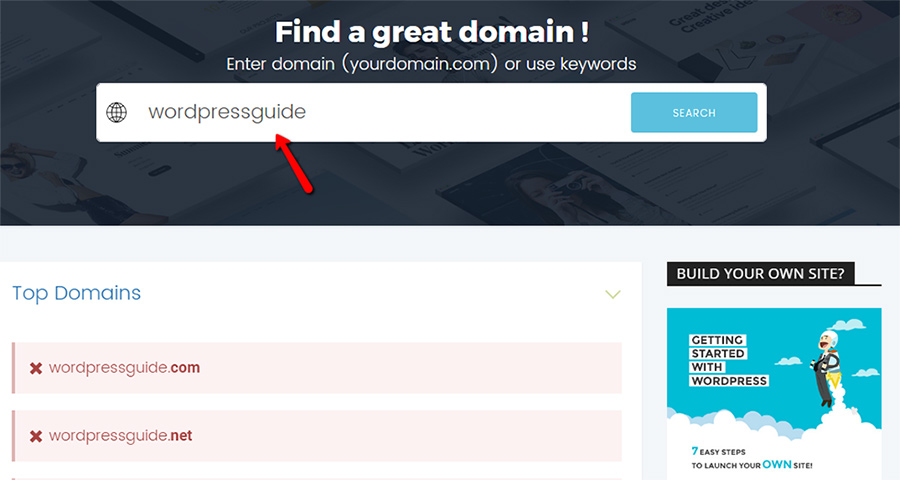Now’s the part where we start going more in-depth with the various aspects of your soon-to-be WordPress site. Let’s start at the beginning:
Your domain name.
If you want a website, you’re gonna need your own domain name. And your domain name is one of the most important decisions you’ll make for your website.
Think of it like a marriage. Just like when you say “I do”, when you pick a domain name, you’re picking it for life. Sure, if things go wrong, you can always get a divorce down the road. But it’s a messy process that most people would rather avoid if at all possible.
So yes, you can change your mind about your domain later on. But it’s not ideal. So put some serious thought into choosing your domain name before launching your website.
How to Pick the Perfect Domain Name
We’re going to lay out some general rules for picking your domain name below. But remember that there are always exceptions. For example, Google.com doesn’t fit most of the rules we’re going to lay out, but they’ve still done pretty well for themselves.
So think of these rules as strong suggestions, but not absolutes:
- Don’t keyword spam. Back in the day, there used to be a technique called exact match domains, where people would try to pick domains with the exact keyword they were trying to rank for. But Google caught on and this is no longer a strategy. Go for something brandable over something stuffed with keywords.
- Keep it short. Try to keep your domain name as short as possible. Ideally, two or three words maximum. Longer domain names are harder to type, harder to remember, and just look plain ugly.
- Make it easy to understand. In the book Thinking Fast and Slow, Daniel Kahneman lays out something called cognitive fluency. Basically, when things feel familiar and easy to grasp, we remember them better and feel more comfortable using them. So make your domain something people can easily grasp.
- Get a .com if possible. This isn’t as important as it once was. It’s certainly a rule you can break. But most of the time, you should still go with .com if it’s available for your chosen domain. People feel more familiar with .coms, which ties with cognitive fluency. Some cute domains break this rule, e.g. geni.us. But if you have the choice between, say, a .com and a .net domain, you should always pick the .com.
- Try to avoid hyphens. Hyphens are ok sometimes (look at our name!). But you generally want to avoid them. Most users don’t expect them and if you ever say your domain name in real life, you’ll need to constantly tell people to put the hyphen in.
- Avoid numbers. Have you ever seen a popular domain name use numbers? We haven’t either. Ok, maybe a few…but most of the time, they’re a bad idea.
- Check if social networking accounts are available. If you want to market your website, you’ll likely need to create social profiles. So before you register any domain name, you should double check whether or not that account name is available on the major social networks. Then, as soon as you do choose your domain name, make sure to register those social accounts.
When in doubt, a good rule is to always use this formula “context” + “brandability”. So use one word for context and one for brandability. For example, look at WP-Compass. The “WP” provides context (WordPress) and the “Compass” provides brandability.
If you pay attention to the domain names of many successful blogs, you’ll see this formula pop up over and over.
Can You Register Any Domain Name You Want?
Nope! Unfortunately, once someone registers a specific domain name, they own it. As long as the domain owner keeps paying the yearly registration fee, no one else can register that domain name.
So when you’re choosing the domain name for your website, you’ll always need to check if your chosen domain is available. Oftentimes, the first few names you think up will already be registered.
To help you find available domain names, we created our Domain Check tool. It will give you domain name suggestions as well as help you figure out whether or not your chosen domain name is available.
To use it, just head here, enter your desired domain name (or keywords), and discover its availability, as well as some suggestions for other available domain names:
 Where To Purchase Your Domain Name
Where To Purchase Your Domain Name
Remember when we mentioned web hosting in the previous section? When you sign up with your web host, most of them will give you a free domain name to go along with your purchase. So you may not even need to purchase your domain name.
But, we think that’s not always the best way. Purchasing your domain from a dedicated domain registrar is a good idea because:
- It gives you added security. If your hosting is ever hacked, your domain name will remain secure. No one can steal it. Most domain registrars also provide two-factor authentication, which is the same type of security used by many banks.
- It makes it easier to switch hosting. If you ever need to change hosts down the road, it’s much easier to do if your domain is registered somewhere else.
Let’s be clear, it’s totally fine to take advantage of the free domain that hosts provide. But if you don’t mind spending an extra ~$10, registering your domain at a dedicated registrar is a best practice.
For domain registrations, we recommend Namecheap.
How to Link Your Domain Name to Your Hosting
We haven’t gone over hosting yet (that’s next!). But once you purchase your domain name, you’ll need to connect it to your web host.
Don’t worry, it’s super simple. All you need to do is change something called Nameservers. If you use Namecheap to purchase your domain name, they have a help article telling you exactly how to do it.
Once you sign up for your host, your host will provide you with the nameservers specific to your account. You just need to plug those into the spots indicated in the Namecheap help article.
If you take advantage of the free domain name offered by your host, you don’t need to worry about doing anything.
In the next article in our guide, we’ll dig into everything hosting. Hosting can be a complicated decision, but we’ll do our best to make everything easy to understand!














